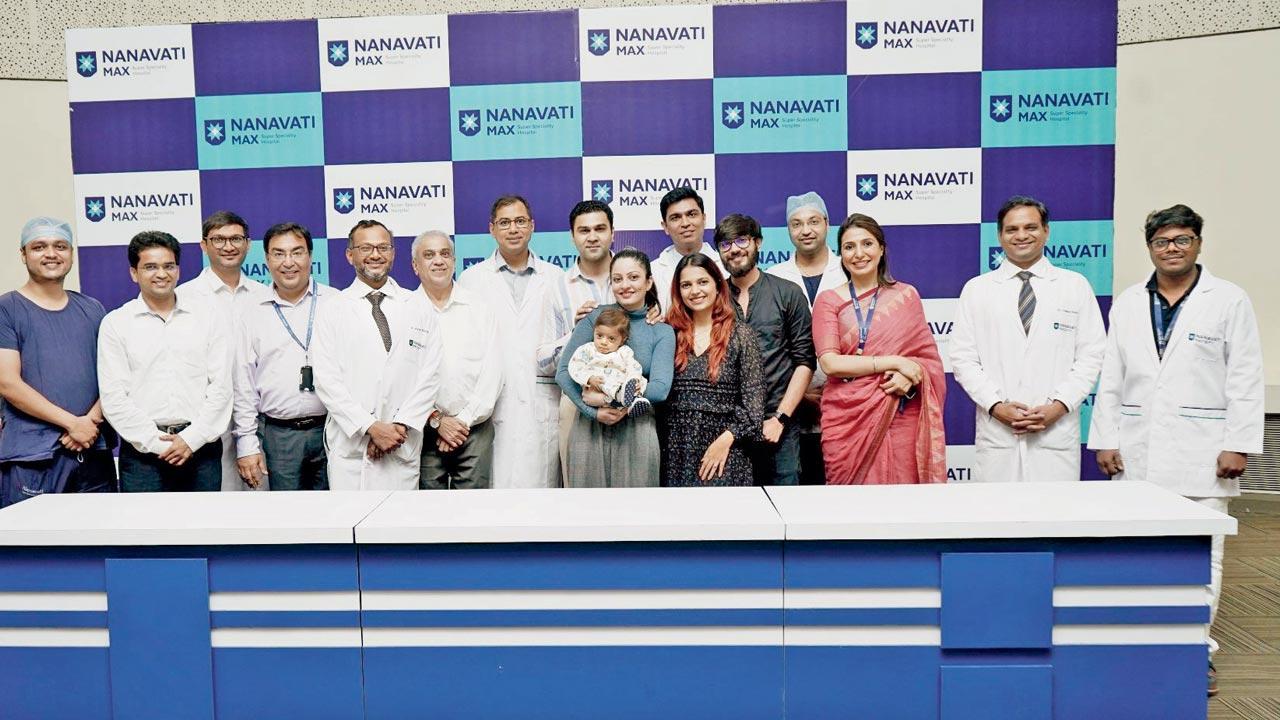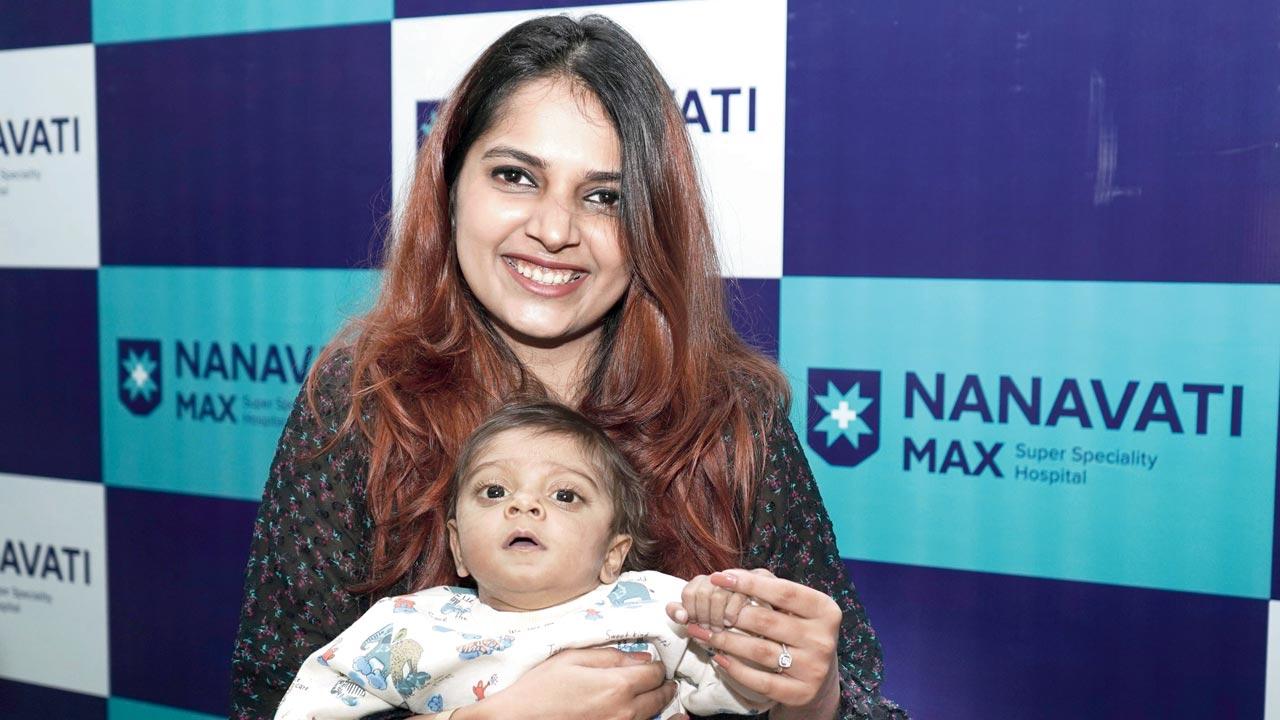Donates part of her liver; infant becomes western India’s youngest ABO-incompatible liver transplant patient, less than 5 such cases reported across the globe

The team involved in the surgery, with Visavadia and her husband Jay Vyas, Vayu and his parents Henal and Nirav Visavadia, and Dr Anurag Shrimal (to Nirav’s right) and Dr Vibhor Borkar (fifth from left)
At a time when newly-weds are thinking of a new life, a new family and home, Vidhi Visavadia, 26, took the brave and tough decision of donating part of her liver, to save her nephew. On the third day after her wedding ceremony on February 22, Visavadia asked her husband and in-laws if she could do so, and they supported her. Her nephew, Vayu, nine months old during the surgery performed at the Nanavati Max Super-speciality Hospital, became western India’s youngest ABO-incompatible liver transplant patient. According to doctors, less than 5 such cases are reported in the medical literature across the globe.
ADVERTISEMENT
An aunt’s love
Visavadia learnt of the baby’s plight through relatives after her wedding ceremony. She had not been told about it before due to the wedding. “I decided this was an opportunity to save the life of a child by donating part of my liver,” said Visavadia who works in a firm but has taken a break due to the surgery.
The Visavadia couple, Henal and Nirav, Andheri residents, welcomed their first baby on October 2 last year. But six days after the birth, they noticed that baby Vayu’s motions were white. The family immediately consulted doctors and it was revealed that the baby had Biliary Atresia (a blockage in the tubes (ducts) that carry bile from the liver to the gallbladder).

Director, Pediatric Haepatology and Gastroenterology, at the Nanavati Max Super-speciality Hospital Dr Vibhor Borkar said, “We decided to go for corrective surgery in the form of Kasai Portoenterostomy (the intestine is joined to the liver). But there is a 50 per cent chance of success and unfortunately it was not fruitful in Vayu’s case. He developed decompensated chronic liver disease with jaundice, coagulopathy (thinning of blood with the absence of clot formation), ascites (fluid in his belly), and growth failure. The only option left to save the life of the baby was a liver transplant.”
The parents had a few tests but both were found unfit to donate part of the organ. In this grim situation, Nirav’s cousin, Visavadia, volunteered for the donation.
Also Read: Mumbai: 54-year-old Andheri-based widower loses Rs 5.28 lakh to sextortion
The procedure
Dr Anurag Shrimal, director - Transplant Surgery Centre for Liver, Pancreas and Intestine Transplantation, who performed the surgery said, “It was a great decision but Vidhi’s blood group is A+ve and Vayu’s O+ve. So the team planned an ABO-incompatible liver transplant. But before going for surgery, she tested positive for COVID-19 and Vayu got infected with pneumonia so the procedure was postponed. The complications and challenges were higher. On August 18 the baby was operated on. It took 6 hours for the transplant and another complex procedure was performed to save his life. There was only 140 ml blood loss during the whole process.”
Dr Borkar added, “Usually, babies are sensitized or develop blood group maturity at 24 months and are fit to undergo ABO-incompatible liver transplants without significant preparation. There is no reported case of sensitisation occurring at the age of nine months. This was the first time in Western India where a de-sensitisation protocol was followed to perform a successful ABO-incompatible liver transplant on a 9-month-old boy.” The surgery cost around R16 lakh. The baby will be on immunosuppressive drugs.
Antibodies and desensitisation
Of all the blood group systems, ABO is the most important of all. There are four different ABO blood groups; Type A, Type B, Type O, and Type AB. All healthy children, from the age of 24 months, start making antibodies against A or B antigens that do not exist in their cells. These antibodies attack and rapidly destroy red cells carrying the corresponding antigen. For example, anti-A attacks the red cells of Group A or AB. Anti-B attacks red cells of Group B or AB. An ABO-incompatible transfusion or transplant can cause serious health complications including organ failure and death.
In the case of Vayu, he developed antibodies at the age of 9 months. As a result, the doctors performed a desensitization protocol (target removal and/or reducing donor-specific antibodies) before the transplant, to negate the chances of rejection. Less than five such cases of desensitization protocol in a nine-month-old liver transplant patient are reported across the world.
 Subscribe today by clicking the link and stay updated with the latest news!" Click here!
Subscribe today by clicking the link and stay updated with the latest news!" Click here!







